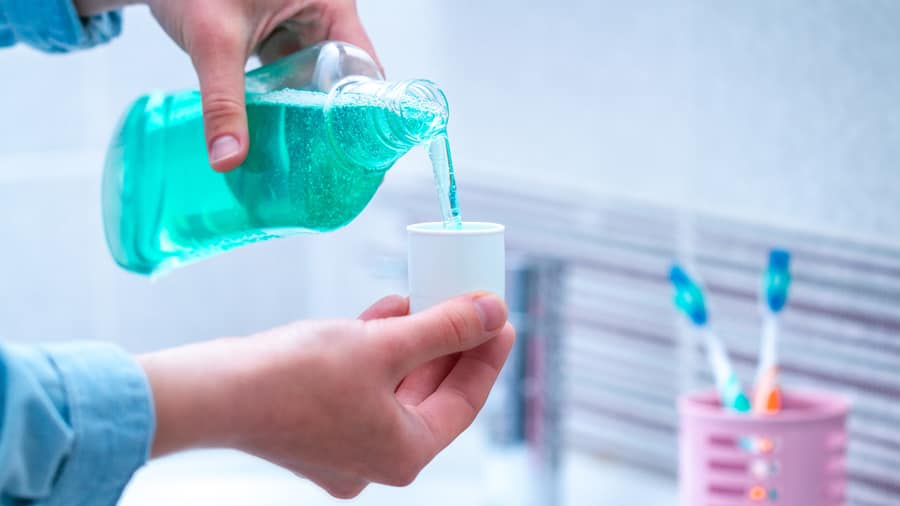What Causes Bad Breath?
Bad breath, also known as halitosis, is an unpleasant odour of the breath that affects many people. It does not always occur suddenly and may have underlying causes within the mouth. Poor oral hygiene stands as the primary cause of bad breath, although other factors may also contribute to this issue.
Identifying the source of bad breath is crucial for effectively addressing the concern. This allows for the selection of appropriate mouth smell home remedies or the determination of whether professional dental intervention is required. Below are some of the common causes of bad breath.
Inadequate oral hygiene promotes bacterial growth, releasing foul-smelling sulphur compounds that cause bad breath.
Reduced saliva production from factors like dehydration or certain medications results in dry mouth, contributing to bad breath.
Advanced gum disease, often caused by plaque buildup or poor oral hygiene, can result in persistent bad breath.
Certain foods, such as garlic and onions, contain compounds that linger in the mouth and contribute to bad breath.
Underlying medical conditions, including infections, diabetes, kidney failure, liver dysfunction, metabolic disorders, and fasting, can also lead to bad breath.
Symptoms of Bad Breath
When it comes to bad breath, it is not always easy to spot it yourself. You might not even realise you have it until someone else points it out. However, there are certain symptoms that can alert you to the issue. These can range from prominent and noticeable odours to more subtle signs, such as changes in your sense of taste.
It is important to be aware of the bad breath symptoms so that you can take the necessary steps to improve your breath and keep it fresh. However, in some cases, bad breath can be a sign of an underlying medical condition, so it is always a good idea to talk to your healthcare professional if you are concerned.
Home Remedies for Bad Breath
If you are searching for natural ways to eliminate bad breath, there are some halitosis home remedies you can try. However, it is essential to remember that these remedies can only provide temporary relief, and if you want a permanent solution, it is necessary to consult a dental professional. Moreover, it is crucial to exercise caution while trying home remedies for bad breath as they are mostly not supported by scientific research.
Hydrate
Drinking enough water is one of the simplest steps you can take to curb bad breath. When your mouth does not have enough moisture to produce saliva, odour-causing bacteria can develop. Although some medications, medical conditions, and illnesses can deprive you of the required moisture, not drinking enough water can also lead to dry mouth in otherwise healthy individuals.
It is critical to stay hydrated, particularly before and after intense exercise, when fast breathing can increase dry mouth. While drinking water is a wholesome habit, make sure you drink water when you wake up. Dryness in the mouth can happen while you are asleep, so hydrating first thing in the morning allows you to get ahead of the bacteria that have accumulated overnight.
Brush and Floss
Daily tooth brushing and flossing are two of the most vital actions you can take to ward off bad breath. According to the Indian Dental Association (IDA), bad breath is caused by the decay of food particles that are not removed from the mouth by brushing and flossing. Therefore, brushing your teeth twice a day for at least two minutes each time is recommended. You can try using a toothpaste that contains dual zinc plus arginine technology to achieve whole mouth health, which provides proactive protection to the whole mouth and helps in preventing the most relevant oral diseases and conditions.
Flossing has now become an indispensable part of daily oral care, and it is recommended that you floss at least once a day. Consistent and proper flossing after every meal reduces plaque, bacteria, and odour-causing food particles. Flossing also helps to prevent periodontal disease, another cause of bad breath.
Clean Your Tongue
The tongue is a significant source of mouth odour. Bacteria can live on the back of your tongue for a long time without being disturbed. Cleaning your tongue can effectively decrease halitosis-causing compounds. These compounds form on your tongue and mouth when bacteria and amino acids combine, emitting an unpleasant sulphur-like smell.
If you are thinking of how to get rid of bad breath naturally, it is recommended that you clean your tongue using a tongue scraper or another device specifically designed for this purpose. Usually, you will need to do this twice a day, but be sure not to press too hard and injure your tongue. Avoid using toothbrushes because they can make you gag.
Eat Healthy Food
It is common knowledge that certain foods, like raw onion or garlic, cause bad breath. When ingested and excreted by the lungs, these foods cause halitosis. However, avoiding acidic foods like vinegar or high-fructose foods such as sugary cereal can also help reduce bad breath, as both acids and sugars promote the production of odour-causing bacteria. Instead, choosing a diet that curbs intestinal upset and controls odour-causing bacteria is advisable.
The Indian Dental Association mentions that sugar-containing foods increase plaque formation and extend the length of time that bacterial acid production can occur; therefore, you should reduce your sugar intake. IDA further notes that incorporating cheese into the diet is beneficial, as it is considered an anti-cavity food that enhances saliva flow, helping in the repair of early cavity formation. Additionally, fruits and vegetables act as natural cleansers due to their high fibre content. Hence, they also suggest incorporating plenty of fresh vegetables into daily meals and opting for fruit, nuts, celery, or carrot sticks as healthy snacks.
Use a Mouthrinse
Remember to rinse your mouth with water after every meal. Swishing water around can help you remove food particles and keep your mouth hydrated. Additionally, you can use a mouth rinse after every meal to help reduce plaque and gingivitis and freshen your breath. However, it is important to note that mouthwash alone is not an effective bad breath remedy and should be used in addition to regular brushing and flossing.
You may use mouthwash twice a day, in the morning and evening. Typically, 2-5 drops are mixed in an ounce of water to swish and gargle thoroughly. This will help kill the bacteria in your entire mouth, including the back of your tongue, and keep your breath fresh.
Use Traditional Remedies
Home remedies that have been passed down through generations can be a good complement to your daily dental care routine. Certain herbs, like fennel, have long been used in some cultures to freshen breath. Fennel can increase saliva production and has antibacterial properties. Just a few sprigs can be used after or between meals to alleviate bad breath.
In addition, the IDA suggests some home remedies for bad breath to help alleviate it, such as gargling a glass of water mixed with lemon juice, drinking pineapple juice, chewing sunflower seeds, and drinking some water. However, it is important to note that while these traditional remedies can be helpful, they should be used cautiously. It is always best to consult with your dentist for optimal treatment.
When to See a Dental Professional?
It may be time to see a dental professional if you have bad breath that persists despite good oral hygiene practices. While various home remedies can alleviate bad breath, they may only provide temporary relief, and the underlying issue may persist. Chronic bad breath can be caused by various factors, such as gum disease, dry mouth, poor oral hygiene, and certain medical conditions. Therefore, it is best to consult a dental professional for proper dental checkups to diagnose the root cause of the problem and provide appropriate treatment.
Bad breath can significantly impact oral health, whether temporary or persistent, but it is often manageable with the right knowledge and proactive measures. Individuals can effectively combat bad breath by adopting good dental hygiene practices, such as regular brushing, flossing, tongue cleaning, staying hydrated, and following a balanced diet. Remember, while home remedies for bad breath can offer temporary relief, chronic bad breath may indicate an underlying dental or health condition that requires professional attention.
Frequently Asked Questions
1. How can I permanently get rid of bad breath?
If you are wondering how to get rid of bad breath permanently, maintain good oral hygiene, clean your tongue, stay hydrated by drinking plenty of water, and avoid odour-causing foods. If bad breath persists even after trying these home remedies, consult a dental professional to address any underlying issues.
2. What is the best natural cure for bad breath?
The best natural remedies for bad breath include staying hydrated, practising good oral hygiene by brushing and flossing regularly and using mouthwashes. Chewing gum which is sugar-free, and avoiding foods that cause bad breath can also help alleviate halitosis. However, it is important to consult your dentist before trying any of these natural remedies.
3. Why do I have bad breath even after brushing?
Persistent bad breath after brushing can result from inadequate oral hygiene, dry mouth, dental issues like cavities or gum disease, or consuming odorous foods. If the problem persists, consulting a dentist is advisable to identify and address the underlying cause.
4. What foods cause bad breath?
Foods that can cause bad breath include onions and garlic. These foods contain compounds that can linger in the mouth and be released during digestion, contributing to bad breath.
This article is intended to promote understanding of and knowledge about general oral health topics. It is not intended to be a substitute for professional advice, diagnosis or treatment. Always seek the advice of your dentist or other qualified healthcare provider with any questions you may have regarding a medical condition or treatment.
ORAL HEALTH QUIZ
What's behind your smile?
Take our Oral Health assessment to get the most from your oral care routine
ORAL HEALTH QUIZ
What's behind your smile?
Take our Oral Health assessment to get the most from your oral care routine













